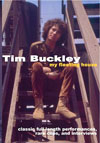|
My
Fleeting House
by
Chris O' Toole
Whilst
never limiting himself to a single genre Tim Buckley achieved
a reputation as one of the finest vocalists of 1960s America.
As a performer and song-writer Buckley is regarded as on a
par with other legends from the era, Neil Young and Bob Dylan
for example, but as a singer Buckley had no equal. His famously
versatile voice propelled him to the forefront of a developing
youth consciousness during his brief career, and despite his
lack of commercial success, he is still considered to be a
true great.
The
aim of the new My Fleeting House DVD is to capture
this career through the medium of television. Collected here
are the fourteen performances Buckley made on television,
largely in Europe, beginning in 1967 and ending with his final
presentation on the Old Grey Whistle Test in 1974.
Through these brief glimpses his fractured career is examined,
from his original baroque folk period, through free-form jazz
and onto the more direct rock approach which characterised
the final stages of his career. The unpredictable and evolving
nature of his work was a further draw for Buckleys fans, both
during his lifetime and to the present day, providing an enticing
alternative to the staid, restrained offerings of his contemporaries.
 |
The
first song of the collection is a take of Song to the Siren
from The Monkees Show in 1967. Even at this early stage
of his career Buckleys obtuse, stubborn and thoroughly independent
nature was apparent. The singer insisted on playing his most
recent composition, a piece which was not even available to
buy and had not been recorded, much to the chagrin of his representatives
and record label. Commercial success never mattered to Buckley.
My Fleeting House successfully outlines his position
outside of the mechanics of the music industry; an industry
he feared, and a fear he would later share with his son Jeff.
Following
this poignant opening subsequent selections all highlight
different elements of a rollercoaster career. No Man Can
Find the War is an overtly political number about the
futility of the war, in direct response to the Vietnam conflict
and eventual draft of Buckleys long term collaborator and
lyricist Larry Beckett.
Happy Time and Sing a Song for You are glorious
love songs, written for one of the carousel of muses Buckley
maintained during his brief lifetime, whereas Blue Melody
shows the opposite of this, recounting the suffering of loss
and rejection.
As
the collection progresses the work becomes more experimental
as Buckley grows in confidence. Interviews with Beckett and
Lee Underwood, Tims guitarist, elucidate on how Buckley developed
his own guitar style and how he found his own voice with regard
to his lyrics. Snippets from David Browne, author of Dream
Brother: The Lives and Music of Tim and Jeff Buckley,
also shed light on his tumultuous personal life and the effects
this had on his career.
The
DVD is however, somewhat limited. Aside from the appalling
infomercial voiceover that opens the disc, the material presented
here is merely a fraction of what makes Buckley a legend.
Whilst My Fleeting House achieves its objective, a
chronicle of Tim Buckleys recorded performances, these televised
performances only show one side of the performer.
Here
Buckley is detached from his natural habitat and without a
live audience. He is unable to experiment under the studio
lights and forced to perform to strict criteria, a notion
utterly foreign to his bohemian, troubadour tendencies. As
such these performances provide only signposts to the direction
Buckley was taking at any one time, never capturing the full
significance of what his recorded output had achieved.
My
Fleeting House can only provide a superficial level of
understanding and is perhaps best suited to long term fans.
That said, however, the DVD provide fascinating insights into
Buckleys enigmatic stage persona, his personal politics and
his unique twelve-string guitar playing. An artefact for dedicated
fans still trying to unravel the Buckley enigma.
©
2007 O' Toole/pennyblackmusic.com
|